

Dr, MD, PhD: Doctor Abbreviations You Need to Know
Medical professionals earn their titles through years of rigorous education and training. Yet confusion persists about when to use "Dr." versus "MD" or how to properly address different types of doctors in professional settings. Understanding doctor abbreviations matters more than casual etiquette—it reflects professional competency and can impact business relationships, academic collaborations, and patient interactions. Whether you're writing formal correspondence, introducing speakers, or navigating healthcare systems, precision in medical titles demonstrates respect for expertise and institutional protocols.
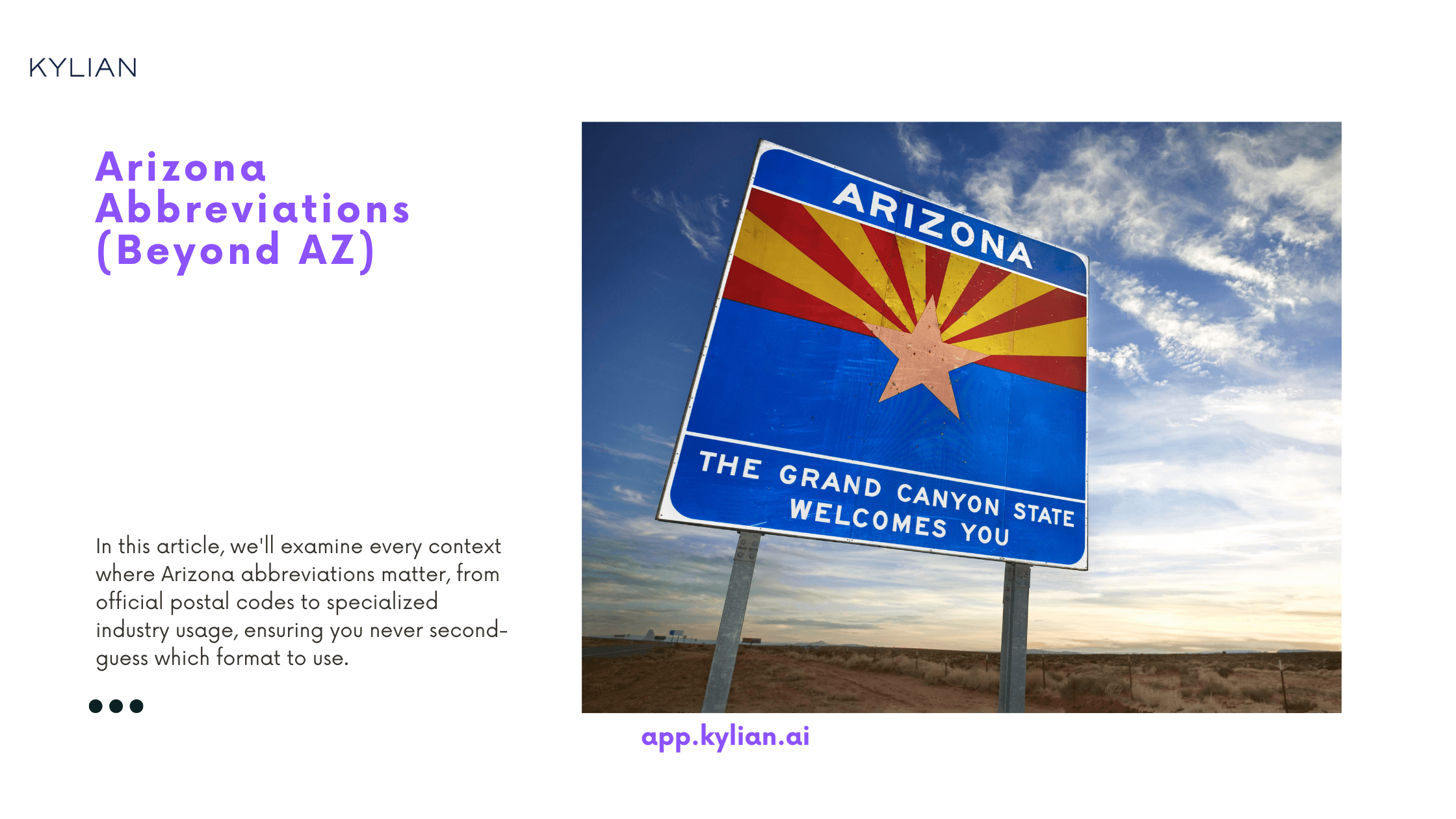

Arizona Abbreviations (Beyond AZ)
Administrative efficiency drives modern communication. Whether you're filling out forms, addressing mail, or coding databases, knowing the correct Arizona abbreviation saves time and prevents errors that cost businesses millions annually in misdirected correspondence. The standard postal abbreviation for Arizona is "AZ" — two capital letters, no periods. This abbreviation appears on everything from tax documents to shipping labels, making it one of the most frequently used state codes in American administrative systems. In this article, we'll examine every context where Arizona abbreviations matter, from official postal codes to specialized industry usage, ensuring you never second-guess which format to use.


Apparatus Plural: Complete Guide to Usage & Forms
Scientific terminology demands precision. Yet one word consistently trips up researchers, students, and professionals across disciplines: apparatus. The confusion stems from its Latin origins and the existence of multiple accepted plural forms—each serving different contexts and audiences. The plural of apparatus can be either "apparatuses" (English pluralization) or "apparatus" (Latin plural, unchanged). Understanding which form to use matters because it signals your audience awareness and linguistic competence in professional and academic settings.


Different One Word Alternatives to Say Entrepreneur
The word "entrepreneur" carries weight in business conversations, but sometimes you need precision over convention. Whether you're crafting a professional bio, writing a business proposal, or simply seeking the exact term that captures your role, the right synonym can transform generic language into compelling communication. Business language evolves rapidly. The entrepreneur label has become so ubiquitous that it's lost impact in many contexts. Smart professionals understand that specificity beats generality when describing their ventures. In this article, you'll discover some alternatives to entrepreneur, each serving distinct contexts and conveying different aspects of business leadership.


What Does "Today's Special" Mean in English?
So you hear English native speakers say "today's special" but don't know what it means? This phrase appears everywhere—restaurants, retail stores, marketing campaigns—yet its nuanced applications often confuse non-native speakers. Understanding "today's special" isn't just about memorizing a definition; it's about grasping the cultural and commercial context that makes this phrase so prevalent in English-speaking environments. In English, "today's special" fundamentally refers to a featured item, service, or offer that is specifically highlighted for the current day. The phrase carries commercial weight, suggesting exclusivity, limited availability, and often enhanced value. This isn't merely restaurant terminology—it's a strategic communication tool used across industries to create urgency and drive engagement.


Past Tense of Fall: 15 Useful Forms & Usage Rules
Mastering irregular verbs separates fluent speakers from beginners. "Fall" ranks among English's most frequently misused irregular verbs, with native speakers often stumbling over its past forms in professional settings. The confusion stems from "fall's" irregular conjugation pattern and its multiple meanings across contexts. Unlike regular verbs that simply add "-ed," "fall" follows an ancient Germanic pattern that defies modern logic. In this article, you'll master every form of "fall" through systematic analysis, contextual examples, and cultural insights that transform grammatical uncertainty into confident usage.


Past Participle of Hold: 53+ Ways to Master "Held"
Grammar fundamentals determine communication effectiveness. The past participle "held" represents one of English's most versatile irregular verb forms, appearing in contexts ranging from business negotiations to casual conversations. Understanding "held" transforms basic sentence construction into sophisticated expression. This mastery enables precise tense usage, passive voice construction, and complex grammatical structures that elevate both written and spoken English proficiency. In this article, we'll examine every application of "held" as the past participle of "hold," providing practical examples and usage guidelines that enhance your grammatical precision.


Birth Date vs Birthdate: Master English Grammar Rules
The distinction between "birth date" and "birthdate" represents more than mere spelling preferences—it reflects fundamental principles of English composition that impact professional communication, legal documentation, and everyday writing. In English, "birth date" functions as a compound noun written as two separate words, typically referring to the specific calendar date when someone was born, while "birthdate" appears as a single word, often used in digital contexts and informal settings. This differentiation matters because incorrect usage can undermine credibility in professional environments, create confusion in legal documents, and signal poor command of English grammar conventions. Understanding when and how to use each form correctly demonstrates linguistic precision that separates competent communicators from those who merely approximate correct usage.
![Came Forms: 97+ Ways to Use This Verb Correctly [Grammar]](/_next/image?url=https%3A%2F%2Fcdn.sanity.io%2Fimages%2F147z5m2d%2Fproduction%2Ffe56b86671350dd07149a8003cd5a5671ca0b894-2240x1260.png&w=3840&q=75)

Came Forms: 97+ Ways to Use This Verb Correctly [Grammar]
Grammar precision matters. The verb "came" appears in countless conversations daily, yet many speakers stumble over its proper usage across different contexts and grammatical structures. Whether you're writing professional correspondence, engaging in casual conversation, or crafting academic content, understanding when and how to use "came" appropriately determines your communication effectiveness. The distinction between "came," "come," and "coming" isn't merely academic—it directly impacts how others perceive your language competency. In this article, we'll explore the complete spectrum of "came" usage, from fundamental applications to advanced grammatical constructions that elevate your English proficiency.
![Doomed Synonyms: 85+ Alternatives [Formal & Literary]](/_next/image?url=https%3A%2F%2Fcdn.sanity.io%2Fimages%2F147z5m2d%2Fproduction%2F46e49c7faa8c349b9f9d46f908ca3dea58c7e760-2240x1260.png&w=3840&q=75)

Doomed Synonyms: 85+ Alternatives [Formal & Literary]
Language precision matters when conveying inevitability and fate. Writers, speakers, and communicators often search for alternatives to "doomed" that capture nuanced meanings across different contexts. The word "doomed" carries weight, but overuse dilutes its impact. Whether you're crafting academic prose, creative writing, or professional communication, selecting the right synonym elevates your message and demonstrates linguistic sophistication. In this article, we'll explore over 85 powerful alternatives to "doomed" across formal, literary, and contextual applications.


NOLA & Beyond: 10+ New Orleans Abbreviations to Know
New Orleans carries more cultural weight per square mile than perhaps any other American city. From jazz birthplace to Mardi Gras capital, this Louisiana metropolis has earned its place in American consciousness through centuries of unique traditions, distinctive architecture, and unparalleled musical heritage. Understanding how locals and visitors abbreviate "New Orleans" matters because it reflects deeper cultural knowledge and regional awareness. Whether you're planning a visit, conducting business, or simply engaging in conversation about this iconic city, using the right abbreviation signals cultural competency and respect for local customs. In this article, we'll explore every major abbreviation for New Orleans, from the universally recognized "NOLA" to lesser-known variations used in specific contexts, plus cultural insights that explain why these abbreviations matter.


Abbreviation for France: Know It All
France's global presence demands precise identification across diplomatic, commercial, and digital platforms. Whether you're processing international transactions, completing official documentation, or managing global communications, understanding France's various abbreviations prevents costly errors and ensures professional accuracy. The complexity emerges from context-dependent usage. ISO standards govern international trade, while Olympic committees use different codes, and postal systems require specific formats. Each serves a distinct purpose, and misapplication creates tangible consequences—from delayed shipments to rejected visa applications. In this article, we'll decode every essential abbreviation for France, examine their specific applications, and provide the contextual knowledge that transforms confusion into competence.
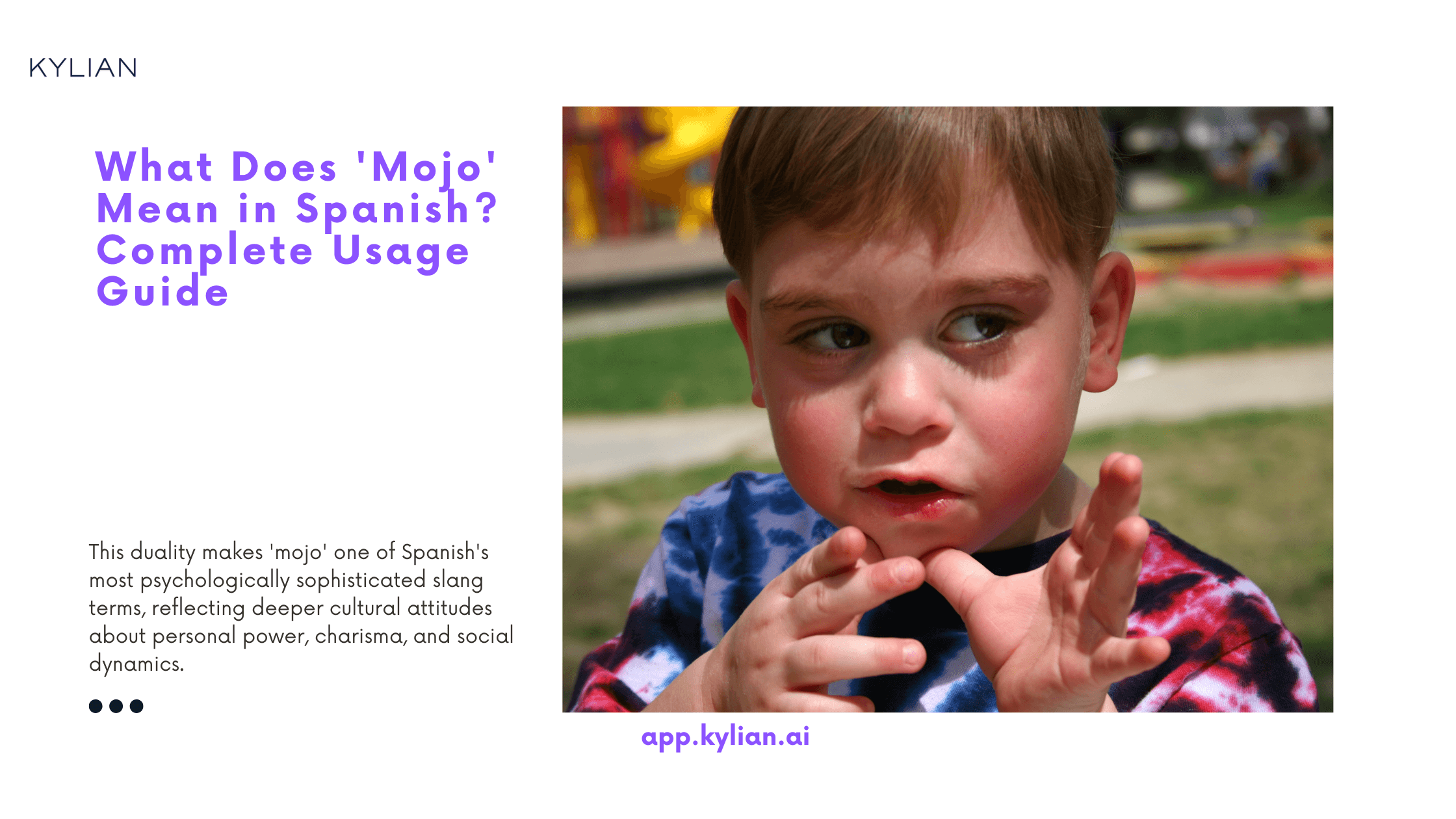

What Does 'Mojo' Mean in Spanish? Complete Usage Guide
So you hear Spanish native speakers say 'mojo' but struggle to grasp its full meaning? The confusion is understandable. Unlike many Spanish words with direct English equivalents, 'mojo' carries cultural weight that transcends simple translation. In Spanish, 'mojo' fundamentally means personal magnetism, charm, or that indefinable quality that makes someone captivating—but this barely scratches the surface of its cultural significance. The word's complexity lies in its dual nature: it represents both an internal quality someone possesses and an external force that can be gained, lost, or manipulated. This duality makes 'mojo' one of Spanish's most psychologically sophisticated slang terms, reflecting deeper cultural attitudes about personal power, charisma, and social dynamics.


Swiss Abbreviations: Key Ways to Reference Switzerland
Banking documents show "CHE" while sports broadcasts display "SUI" and postal codes use "CH" – why does Switzerland have multiple abbreviations? The answer reveals fascinating layers of linguistic heritage, international standardization, and practical communication needs. Understanding Swiss abbreviations matters because misusing them in professional contexts signals unfamiliarity with international standards. Whether you're processing financial transactions, shipping packages internationally, or analyzing Olympic data, each abbreviation serves specific purposes within distinct systems. In this article, we'll decode every major Swiss abbreviation, explain when to use each one, and reveal why this small nation requires such diverse representational codes.
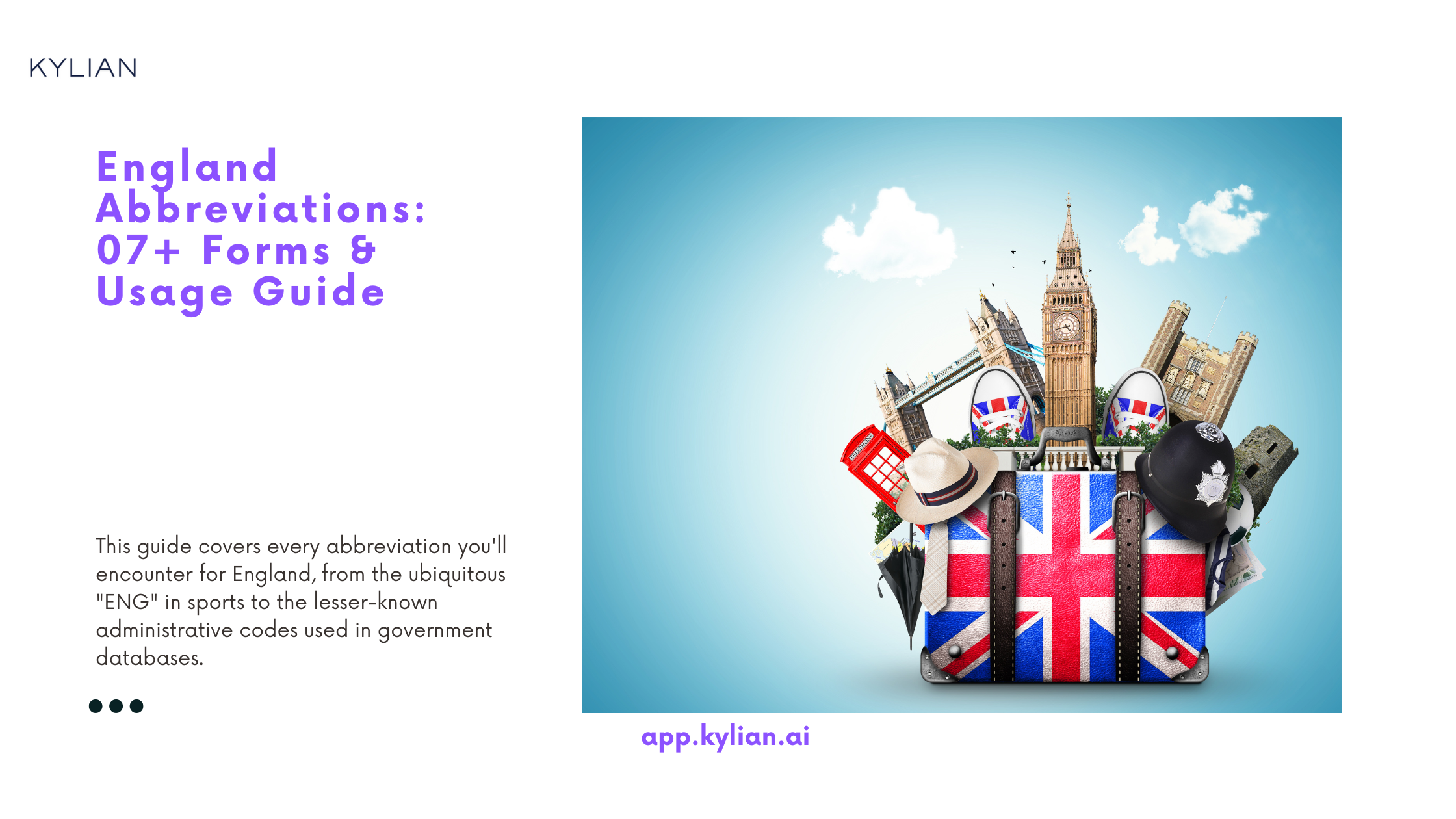

England Abbreviations: 07+ Forms & Usage Guide
Geographic precision matters more than most realize. Whether you're filling out international forms, writing business correspondence, or simply trying to understand postal codes, knowing the correct abbreviation for England eliminates confusion and demonstrates professional competence. The challenge extends beyond memorizing a few letters. England operates within a complex administrative framework as part of the United Kingdom, creating multiple valid abbreviations depending on context. Some abbreviations work for sports, others for official documents, and certain forms apply exclusively to postal services. This guide covers every abbreviation you'll encounter for England, from the ubiquitous "ENG" in sports to the lesser-known administrative codes used in government databases. You'll understand when to use each form and why context determines correctness.


People's Lives vs People's Life: English Grammar Nuances
The distinction between "people's lives" and "people's life" represents one of the most subtle yet critical aspects of English grammar that native speakers intuitively grasp but rarely articulate. In English, "people's lives" refers to the individual existences of multiple persons, acknowledging that each person possesses their own distinct life experience, while "people's life" suggests a collective or shared existence among a group. This grammatical nuance carries profound implications for how we conceptualize individuality versus community in our communication.


Bear Past Tense: Bore, Born, Borne - Master All Forms
English learners consistently struggle with irregular verbs, and "bear" ranks among the most confusing. This verb transforms into multiple past forms - bore, born, and borne - each serving distinct grammatical functions that native speakers use intuitively but rarely explain systematically. Understanding these forms matters because "bear" appears in countless contexts: bearing children, bearing witness, bearing fruit, bearing responsibility. Misusing these forms signals incomplete English mastery and can obscure meaning in professional and academic writing.


Past Tense of Bend: A Guide to Master This Irregular Verb
Grammar mistakes cost credibility. When you misuse irregular verbs like "bend," you signal linguistic uncertainty that undermines your message before anyone evaluates its content. The past tense of "bend" is "bent"—not "bended," despite what intuition suggests. This distinction matters because irregular verb mastery separates fluent speakers from those still learning fundamental patterns. In this article, you'll discover the complete conjugation system for "bend," understand when exceptions apply, and learn contextual usage that transforms mechanical knowledge into natural expression.


Past Tense of Slide: Key Forms & Usage Examples
Mastering irregular verbs separates confident speakers from hesitant ones. The verb "slide" presents a particular challenge because its past forms don't follow standard patterns, and misusing them immediately signals uncertainty to listeners. Whether you're describing a baseball player stealing second base or explaining how market prices declined, understanding "slide's" past tense forms ensures your communication remains precise and professional. The stakes matter more than you might think—irregular verb errors undermine credibility in both casual conversations and formal presentations. In this article, we'll decode every aspect of "slide's" past tense usage, from basic conjugations to advanced contextual applications that native speakers use instinctively.
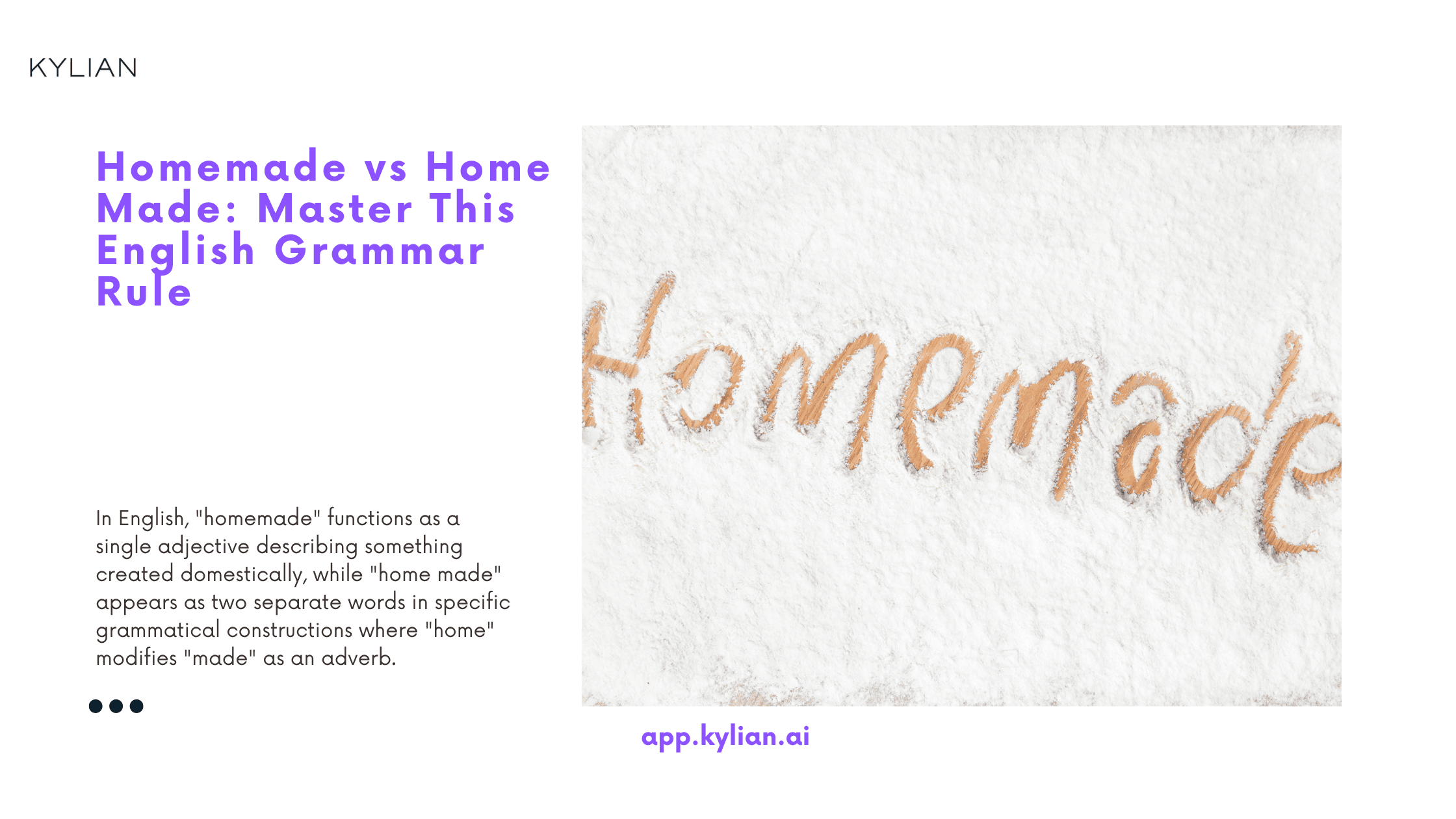

Homemade vs Home Made: Master This English Grammar Rule
The distinction between "homemade" and "home made" represents more than a simple spelling choice—it reveals fundamental principles of English compound word formation that impact professional communication, academic writing, and everyday clarity. In English, "homemade" functions as a single adjective describing something created domestically, while "home made" appears as two separate words in specific grammatical constructions where "home" modifies "made" as an adverb. This grammatical precision matters because misusing these forms signals incomplete mastery of English compound structures, potentially undermining credibility in professional contexts where linguistic accuracy directly correlates with perceived competence.


What Does Buongiorno Mean in Italian: Complete Guide
You encounter Italian speakers using "buongiorno" throughout your day, yet its precise meaning and proper usage remain unclear? This comprehensive analysis eliminates that confusion. In Italian, "buongiorno" translates directly to "good day" in English, functioning as both a greeting and farewell depending on temporal and social contexts. The significance of mastering "buongiorno" extends beyond basic politeness. Italian communication culture places substantial weight on appropriate greetings, with incorrect usage potentially signaling cultural insensitivity or linguistic incompetence. Understanding this word's nuanced applications becomes essential for anyone engaging with Italian speakers professionally or personally.


Plural of Family: 15 Key Rules for Families vs Family's
English pluralization rules create confusion even for native speakers, and "family" represents one of the most frequently questioned examples. The distinction between "families," "family's," and "families'" determines whether you're discussing multiple households, showing possession, or indicating plural possession. Misusing these forms undermines professional communication and academic writing. Understanding the correct plural of family eliminates ambiguity in contexts ranging from demographic research to legal documentation, where precision matters for accurate interpretation.
![Different Ways to Use “Bow” [Formal & Slang]](/_next/image?url=https%3A%2F%2Fcdn.sanity.io%2Fimages%2F147z5m2d%2Fproduction%2F5e0a426e5cea9c16fddaa664dad0603ef5dfbf82-2240x1260.png&w=3840&q=75)

Different Ways to Use “Bow” [Formal & Slang]
Understanding bow slang matters because miscommunication in informal settings can derail conversations, damage relationships, and signal cultural disconnect. Whether you're navigating online gaming communities, street conversations, or generational language gaps, mastering these variations prevents embarrassing misunderstandings. In this article, we'll dissect 45+ ways "bow" functions in contemporary slang, from respectful acknowledgments to dismissive exits, complete with context-specific usage guidelines and cultural implications.
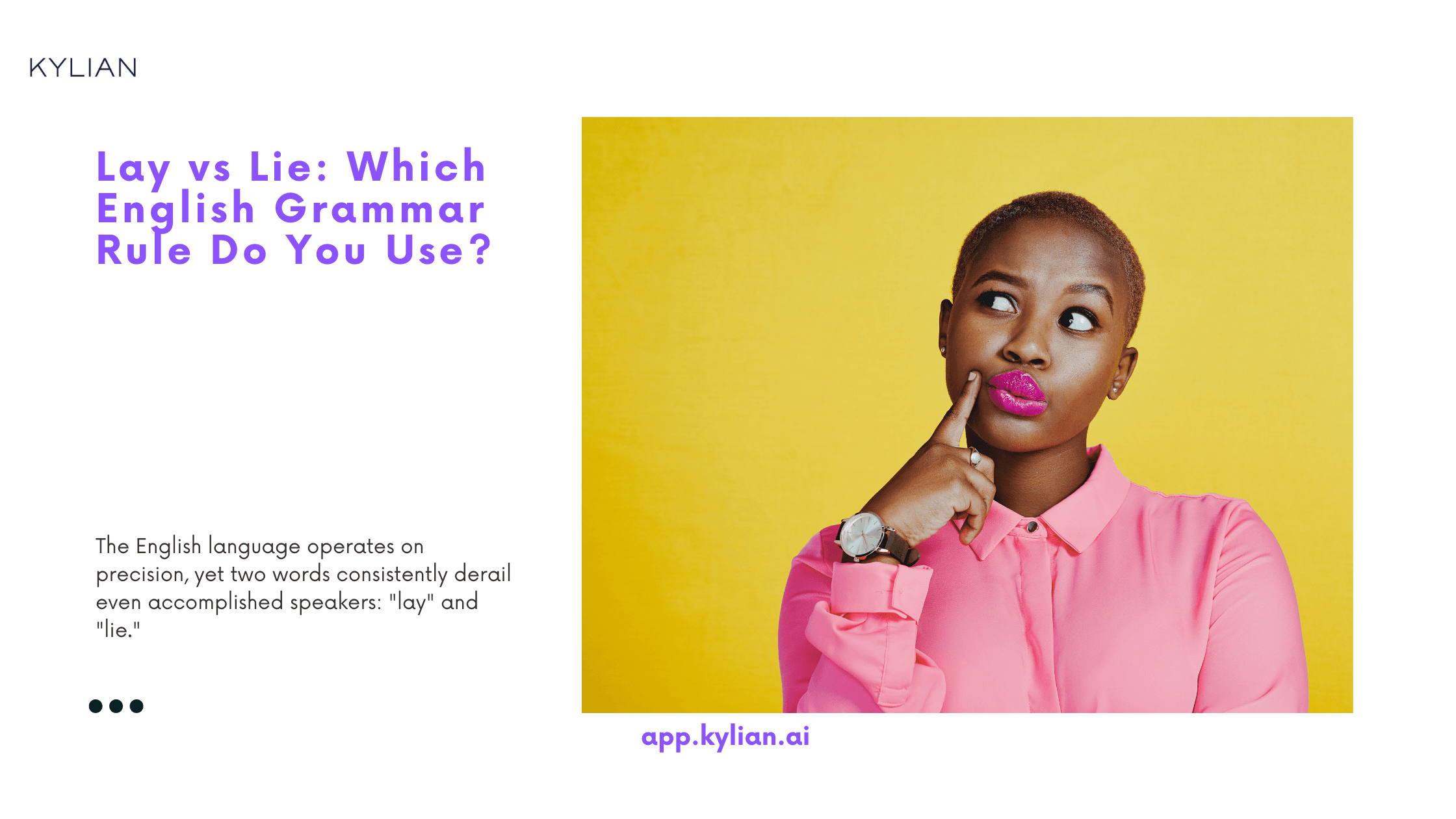

Lay vs Lie: Which English Grammar Rule Do You Use?
The English language operates on precision, yet two words consistently derail even accomplished speakers: "lay" and "lie." In English, "lay" means to place or put something down in a specific position, requiring a direct object to complete its meaning. Meanwhile, "lie" means to recline or rest in a horizontal position, functioning as an intransitive verb that needs no direct object. This distinction matters because misusing these verbs signals a fundamental misunderstanding of English grammar mechanics—one that undermines credibility in professional and academic contexts.